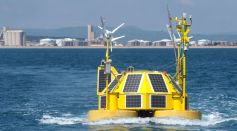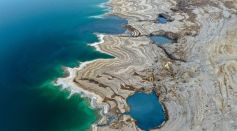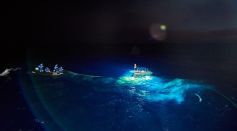Tags: Oceans
Fisherman Catches Strange Sea Creature Dubbed 'Frankenstein Fish' in Deep Waters of Russia

Is Dumping Old Spacecraft in Point Nemo A Good Idea? Why Are Environmentalists Against It?

Rogue Wave That Occurred in 2020 Breaks Record Reaching 4-Story-Tall High

Climate Change Impacts Global Oceans Wherein 70 Percent of Worldwide Fisheries Could be Suffocated Due to Oxygen Loss

What If the Moon Will Explode and Disappear? Living Things, Oceans, Ecosystem, and Climate Affected

Ocean Salinity: Seawater is Less Salty Today Than First 500 Million Years of Earth
Sun a 'Surprising Source' of Unexplained Water on Earth: What is Solar Wind Theory?

The Earth is Turning Dark: New Study Reveals Possible Link to Climate Change

Macroplastic Pollution: Research Reveals It’s Clogging River Systems for Longer Periods Than Previously Believed

Sunlight Exposure for 100 Hours or Less Melts Plastics, Breaks Them Down Into Smaller Soup of New Chemicals

Whales and Fishes Absorb Greenhouse Gases, Reduce Atmosphere Emissions

Five Deeps Expedition Concludes Marianas Trench Still the Lowest Point on Earth's Oceans
Seafloor Mapping Reveals 25,000 Barrels of Waste, Toxic Debris Off Los Angeles Coast
Phytoplankton Genes Used by Researchers to Monitor Ocean Conditions
Scientists Study Impacts of Acidic Water on Octopuses

Discarded Face Masks and PPEs End Up in Oceans
New Species of Giant 'Sea Cockroach' Can Grow 20 Inches in Length
Floating Rocks Size of Manhattan Brave The Oceans
Carbon Dioxide Emissions May Trigger a Devastating Reflex in the Carbon Cycle, Study Finds
Scientists measure anthropogenic carbon dioxide in oceans
Most Popular

Brain Health Aging Guide: Effective Strategies for Cognitive Decline Prevention and Lower Dementia Risk

Microplastics Are Everywhere — How Plastic Pollution Threatens Wildlife, Soil, and Water

Mitochondrial Health and Aging: How Cell Energy Drives Modern Anti-Aging Science

How Scientists Use Radio Telescopes to Search for Alien Signals Across the Universe





